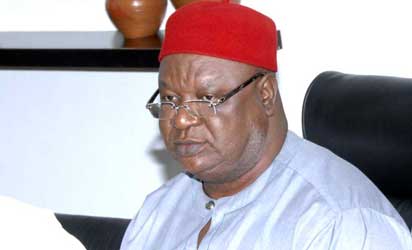Former Senate President and Secretary to the Government of the Federation, Ayim Pius Anyim, painted a grave picture of life in the South East on Thursday, calling for a rethink of the Biafra agitation and strategies to deal with insecurity in the region.
He warned that going by recent developments, the region risks losing economic and political relevance in the country, with drastic consequences already being felt by the people of the region after years of insecurity and agitation that have been used as a cover by criminal elements to thrive.
“In the last four years, every Monday has been declared by some non-state actors as sit-at-home day. The enforcement has been brutal, leading to enormous loss of lives and property,” Senator Anyim said at the 2023 South East Summit on Economy and Security. “It is estimated that hundreds of lives and hundreds of billions of naira have been lost to the sit-at-home order”.
The implication of this is being felt by all residents of the region, including successful people, who are often targeted for kidnapping and assassination.
“Life has become very difficult in the South East and almost every successful person in the South East is in self-exile. If care is not taken, very soon, none of us will come home, no matter the number of security personnel you carry,” Senator Anyim said.
“Social and economic activities have been dislocated, businesses have collapsed, no social activity can any longer simply take place in the zone and no new businesses are being attracted. If care is not taken, very soon every means of livelihood in the zone may dry up.”
When it comes to politics, the former Senate President said, “Heavy arms and ammunition have become instruments of political campaigns, resulting in gross voter apathy. If care is not taken, very soon South East will lose national political relevance as votes from South East will no longer be of any consequence.
“Crime and criminality have become widespread in South East because common criminals have taken advantage of the agitation to advance their evil enterprise.”
According to him, with life increasingly unbearable in the region, there is an urgent need to review the agitation for Biafra and adopt new approaches to life and governance in the region. He said, “There is a nexus between the high level of insecurity in the South East and the fact that some criminal elements are unleashing mayhem under the cover of agitation for Biafra.
“We must emphasise that the circumstance that led to Biafra agitation in 1967 is not the same as what is happening today. Therefore, we must endeavour to point out the difference in the present agitation.
“Today, we do not have anything that in any way approximates the situation in 1967. There is absolutely no consensus on the purpose, content, method, and boundaries of today’s Biafra agitation. I therefore call for a rethink by all those involved in this agitation. In rethinking the Biafran agitation, we need to honestly articulate what has been the outcomes or impact of the agitation so far.”
For Senator Anyim, the situation can be turned around by providing the youth and those in authority with data on the real losses and consequences of insecurity in the region and a return to the economic systems that made the South East a model of economic strength and growth in the past.
He pointed out that the attention of governments in the region has shifted, with governors paying little to no attention to the development of industrial estates and corridors. This, he explained, may be responsible for the upsurge in crime.
He also faulted the weakening of the South-East’s social entrepreneurship and apprentice system, which was very popular in the region in the 1970s and 1980s.
He called for the reform and strengthening of the system and the development of the industrial estates to ensure the South-East continues to contribute significantly to global economic development and growth.
Senator Anyim also called for a new approach to politics as the current trend was worsening insecurity.
Of the current trend, he said, “I observed that in the 1960s, government officials and elected representatives struggled to make ends meet. But, today, the shortest cut to affluence and fame is to have access to government appointments or to be elected as an honourable member. This has created an unhealthy competition in the politics of our time, leading to the militarisation of our political processes and consequential effects on insecurity.”







